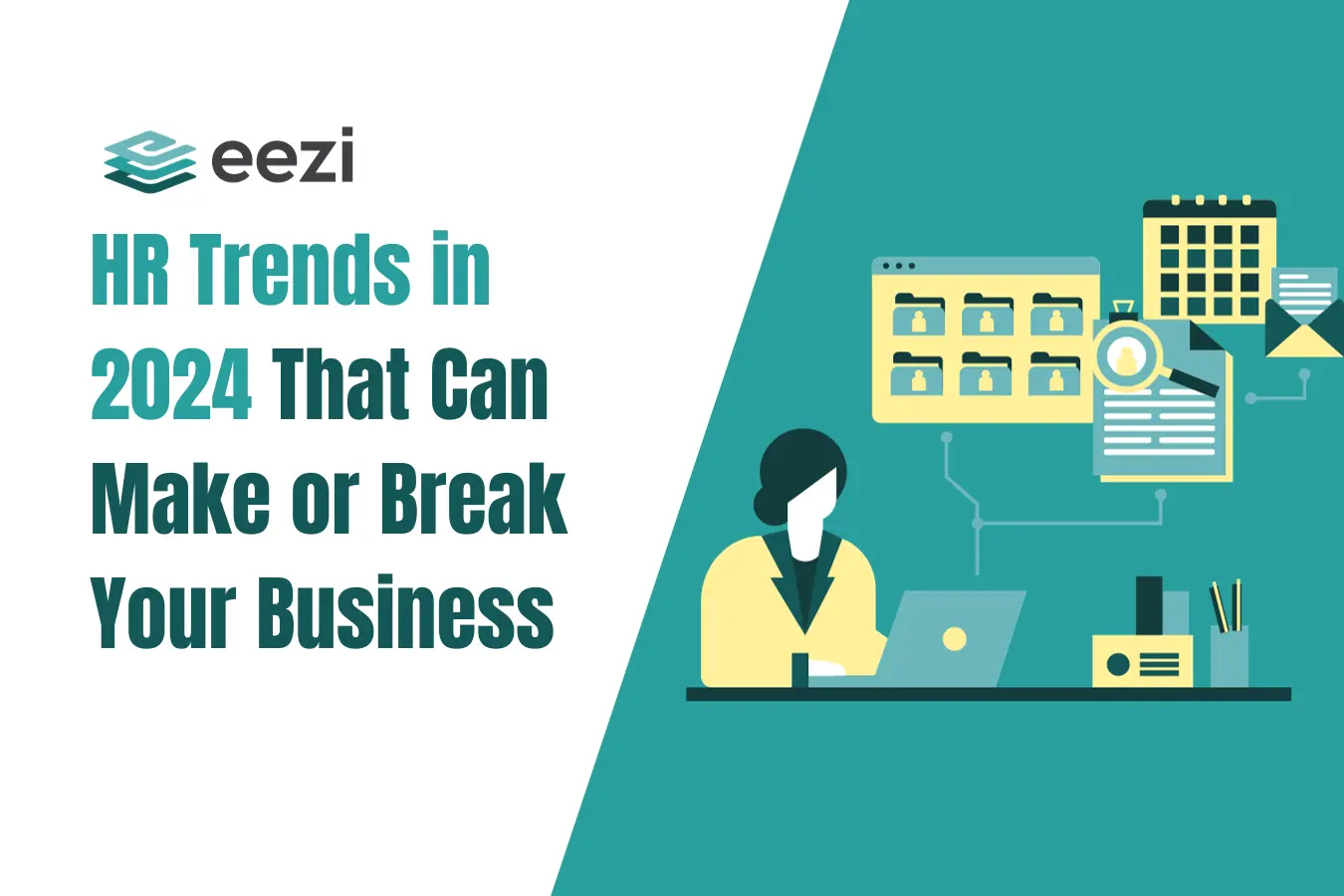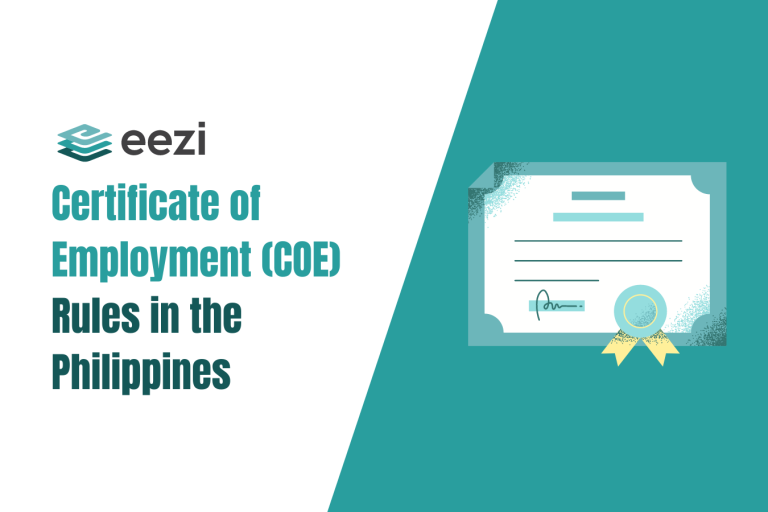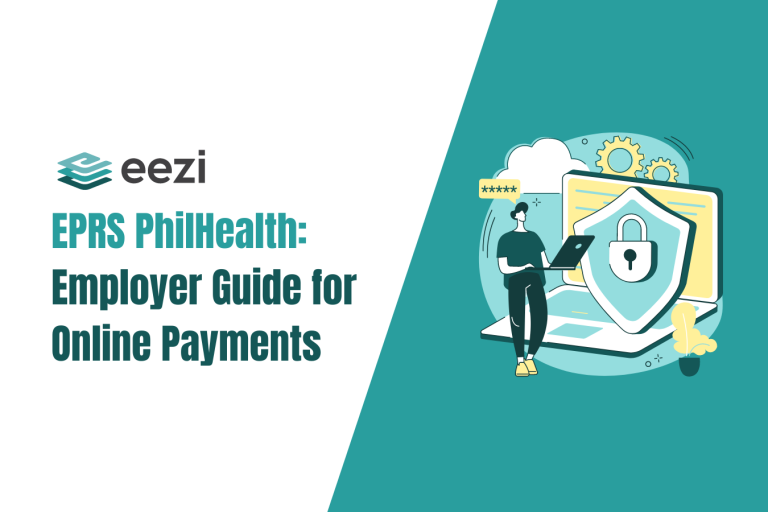Here are the top HR trends in 2024 that you should consider.

Keeping abreast of evolving human resources (HR) trends is important to maintain your business success. Several transformative HR trends are poised to reshape the workplace, offering unprecedented opportunities for organizational growth.
We see an increase in the integration of advanced technologies, such as artificial intelligence and data analytics for smarter decision-making. In addition, there is also an increased emphasis on diversity and inclusion.
At the same time, there is a shift into human-centric culture and employee wellness initiatives. Overall, these trends reflect a progressive transformation in the way businesses approach talent management.
In this article, we will provide you with valuable insights to empower your businesses this 2024. This way, you can stay ahead and maintain a competitive edge in the rapidly changing labor market, professional environment, employee engagement, and career management.

Notable trends in human resources in 2024
Flexible work models
Setting up flexible work arrangements for your employees is a cornerstone of modern employment strategies. At the same time, this also caters to the diverse needs of the workforce.
Employees have unique responsibilities and preferences. Recognizing this can help organizations and HR departments adopt flexible working arrangements that empower their teams to achieve work-life balance.
Under this model, you embrace remote and flexible work options, flexible schedules, and alternative arrangements.
By accommodating individual circumstances, such as family obligations or personal preferences, companies foster a more inclusive and adaptable workplace. The result is increased employee satisfaction, productivity, and retention.
Read more: How does payroll automation reduce HR cost
Boost with generative AI
Many expect that the integration of generative artificial intelligence (AI) will transform HR functions and processes this year. Beyond automation, this cutting-edge technology actively contributes to decision-making and problem-solving within human resources.
With generative AI, HR leaders and professionals can simplify tasks like candidate sourcing, talent matching, and employee onboarding.
By boosting traditional processes, AI can help HR departments and teams better focus on strategic initiatives. Overall, the result is a more dynamic and responsive workforce.
As AI continues to evolve, its application in HR promises increased productivity. More importantly, it brings transformation in many organizations’ approach to talent management.
Human-centric approach
A human-centric approach to team leadership and workforce management is important in employees’ well-being and individual needs. This leadership style needs open communication, empathy, and positive employee experience. But most importantly, it needs a keen understanding of each team member’s strengths and aspirations.
Leaders can enhance employee experience and productivity by creating a supportive environment that values work-life balance, mental health support, and professional growth. Ultimately, this approach recognizes the unique contributions of each team member, promoting collaboration, innovation, and organizational development.
Predictive data and workforce analytics
Predictive data and workforce analytics have become essential in HR management and staffing strategies in recent years. With advanced analytics, organizations can anticipate future trends and identify potential talent. In addition, they also help HR experts make informed decisions regarding employee career progress and development and intelligent workforce planning.
Predictive analytics in HR technology can analyze historical data to forecast future workforce needs, enabling proactive talent management. Moreover, it optimizes repetitive tasks in recruitment processes by identifying the most suitable candidates or internal talent and reducing time-to-hire.
In addition, workforce analytics helps assess employee performance and engagement, making HR decisions more data-driven. This synergy of predictive data and analytics enhances your recruitment efficiency. On top of this, it empowers HR departments and professionals to strategically align talent with organizational goals.
Implementation management
Implementation management is vital in navigating changes and challenges in the workplace environment. As organizations undergo transformations, adept implementation management ensures the smooth execution of new strategies, technologies, or policies.
Change, regardless of whether it is good or bad, is often met with resistance. As such, this process often needs meticulous planning, communication, and coordination to mitigate resistance and ensure a positive transition. It empowers leaders to address employee concerns, align teams with evolving goals, and optimize workflows effectively.
Ultimately, the success of your implementation would depend on your management. This will determine your success in navigating through any workplace changes.
Reliance on HR analytics
HR and people analytics are only valuable when you can apply transformative changes for human resources management.
As organizations embrace data-driven decision-making, HR analytics emerges as a key player. It provides actionable insights into workforce trends, employee performance, and overall organizational health.
With the help of predictive data analytics, HR professionals can have a more comprehensive understanding of the workforce. This usually entails data on talent and staff acquisition, retention strategies, and employee engagement.
Such tools provide a clearer view of the workforce and enhance HR’s ability to align personnel management with organizational goals.
To sum up, analytics is the key to cultivating a proactive, informed, and adaptive HR function.
Focus on employee well-being.
Prioritizing employee well-being is the foundation of a thriving workplace culture. By placing importance on the employees’ physical, mental, and emotional health, organizations create a supportive environment that enhances employees’ job satisfaction and productivity.
In action, this may include initiatives such as wellness programs, flexible work arrangements, and mental health resources. All in all, these contribute to a holistic approach to employee well-being.
Modern HRs recognize the overlap of personal and professional life and focus on promoting work-life balance, reducing stress, and boosting overall morale.
When applied, organizations that focus on employee well-being will attract and retain top talent. In addition, they also cultivate a resilient workforce that positively impacts performance and contributes to long-term organizational success.
DEI in the workforce
Elevating diversity, equity, and inclusion (DEI) is another important aspect of a dynamic and harmonious work environment. Such is especially true for companies with global workforces.
A diverse and equitable workplace also benefits from this inclusion as it ensures a wider range of perspectives, experiences, and talents, driving innovation and creativity. Overall, the goal is equity.
Equity aims at fair opportunities and promotes a level playing field for all employees. Moreover, inclusion fosters a sense of belonging, empowering individuals to contribute their best. Organizations prioritizing DEI cultivate a socially responsible image and attract and retain diverse talent.
By championing these principles, workplaces become more reflective of a globalized world.

The role of HR professionals in the modern workplace
Human resources (HR) professionals play an important role in navigating and implementing current trends.
More organizations are adapting remote and hybrid work practices, diversity and inclusion, and technological advancements. As such, HR professionals and experts become essential architects of workplace strategies and employee lifecycle management. They spearhead initiatives to foster a diverse workforce, ensure equal opportunities, and promote a culture of inclusivity.
Moreover, HR professionals are at the forefront of utilizing technology for many aspects of their work. These include external talent and staff acquisition, employee engagement, internal mobility, and data-driven and informed decision-making.
Their ability to align functions, administrative tasks, and practices with emerging trends in the HR landscape enhances organizational efficiency. Additionally, they also shape a resilient and forward-thinking workplace that promotes transformation and innovation in staffing, external hiring, and productivity gains.
Preparing your HR Teams
As businesses and organizations embrace flexible work models, HR experts and professionals must adapt strategies for sourcing, evaluating, and onboarding talent remotely. This demands a technological upgrade, emphasizing virtual communication tools and robust digital recruitment platforms. Training HR teams to navigate the nuances of remote hiring ensures a seamless and inclusive process, considering diverse candidates.
All in all, fostering a proactive and collaborative mindset among HR professionals prepares them to leverage innovative solutions, making hybrid and remote talent acquisition a strategic advantage in attracting and retaining top talent in today’s dynamic job market.
What is the future of HR in the next 5 years?
Predicting the future is challenging, but several trends are likely to shape the field of human resources (HR) in the next five years:
- Technology Integration: Increased use of AI, machine learning, and analytics will streamline HR processes, from recruitment to performance management.
- Remote Work Dynamics: With the normalization of remote work, HR will focus on creating flexible policies, virtual team-building, and addressing challenges associated with a distributed workforce.
- Employee Wellbeing: HR will place a stronger emphasis on holistic employee well-being, including mental health support, work-life balance, and personalized wellness programs.
- Diversity, Equity, and Inclusion (DEI): Organizations will intensify efforts to create diverse and inclusive workplaces, with HR taking a lead role in promoting equality.
- Continuous Learning and Upskilling: HR will prioritize ongoing learning and development programs to adapt to the rapidly changing job landscape and upskill employees for emerging roles.
- Data-Driven Decision-Making: The rising trend involves HR experts relying more on data analytics for well-informed decision-making regarding staff acquisition and management, retention programs, and workforce planning and distribution.
- Agile HR Practices: HR will adopt agile methodologies to respond quickly to organizational changes, fostering adaptability and resilience within the workforce.
- Focus on Employee Experience: Enhancing the overall experience of employees will be a key priority, encompassing everything from onboarding processes to career development opportunities.
- Global Workforce Management: HR will grapple with managing diverse, global teams, addressing cultural nuances, and ensuring a cohesive organizational culture across geographical boundaries.
- Environmental, Social, and Governance (ESG) Considerations: HR will play a role in aligning workforce practices with broader ESG goals, reflecting a commitment to sustainability and corporate social responsibility.
Position your business for growth with eezi
Harness the power of data-driven decision-making, elevate your remote work strategies, and embark on a journey towards agile HR practices. Take the lead – embrace innovation with Eezi today!



